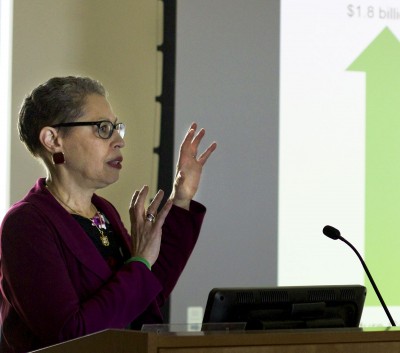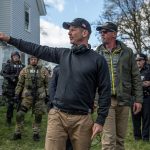
Hosted through the National Institutes of Health, BU is one of the 17 schools hosting the program in the nation. BEST works with industry partners to align curriculum and meet demands of the workforce, BU BEST’s website states.
Barbara Schreiber,one of the principal investigators for BU’s BEST, said the program is geared toward helping doctoral students and post-doctoral researchers find careers subsequent to their education.
“We had developed some programming [such as] workshops, seminars, career panels on this campus over the past couple of years,” she said. “One of the big things that we have started to do … is to attend the faculty meetings at each participating department that we are reaching out to … We’ve generated a lot of discussion, and we’ll continue that discussion.”
The week features various career-building gatherings on both the Medical Campus and the Charles River Campus.
“In addition to reaching out to the departments, we’re trying to do more campus-wide advertising for the program [like] bringing in people [and] setting up panels to discuss different topics,” said William Cruikshank, another principal investigator for BEST. “We’re hoping by the end of this week, we’ll have begun to build momentum for the program and have people at least interested in finding out what we offer.”
Cruikshank said he hopes students will know about the program and its resources.
“What I would hope for is, first of all, that the students know that we’re here, that the program exists, that the program presents an innovative way to think about and prepare for the next career steps,” he said.
BEST hosted a keynote address Tuesday delivered by Susan Windham-Bannister, the president and CEO of Massachusetts Life Sciences Center.
Windham-Bannister spoke about preparing the next generation of leaders in the science world.
“We have put a lot of money in for equipment and supplies in schools for science programs,” she said. “What we do in the Life Sciences Center is fund internships for students.”
She said there is a high demand in the field for those qualified.
“For women and people of color, it is wonderful that they are pursuing careers in life sciences because we are greatly under-represented,” she said. “There are a variety of opportunities for those who have skills in the life sciences field.”
Following Windham-Bannister’s address, she and four other prominent members of the medical field participated in a panel about building a diverse career portfolio in science.
“You’ve got an incubating space here at BU,” Windham-Bannister said during the panel. “You just have to go out and get the exposure. It’s not necessarily that you’re going to take some classes that will make all these things click for you … it’s a great way to put the real world around the things that you’re learning in the classroom.”
Panel member Craig Sorensen, vice president of Vertex Pharmaceuticals, stressed the importance of networking in landing a job.
“On these networking events, everyone’s going to want to talk to you because even though they might not be in [Human Resources], everyone is out there scouting for talent,” he said on the panel. “Don’t let them fool you … the names go back.”
Beth Hovey, an analyst at Decisions Resources Group, drew from her own experiences and encouraged the attendees to volunteer to gain experience and connections.
“It really helped me to learn some of those leadership skills that you wouldn’t necessarily learn,” she said during the panel. “Volunteer. Meet new people. You make a lot of your network and people see you in action, and they can vouch for you on your leadership skills.”
Several attendees said the keynote speaker and panel were helpful and informative.
“I know that I’m interested in pursuing a career in industry, and I decided that my background and exposure to the field is null, nearly zero and I needed that exposure. I needed to understand too how diverse industry is because I didn’t really understand the different avenues of industries down the line,” said Sandy Serizier, a third-year Ph.D student in the Graduate School of Arts and Sciences.
Zach Beer, a post-doctorate student in GRS, said BEST presents opportunities to advance career options, but could have been better efforts to market.
“I had some friends who didn’t know about it,” he said. “Maybe if people knew about it more, the attendance would probably be more impressive.”
Albert Mondragon, a third-year Ph.D student in GRS, said the new program will be invaluable for jumpstarting his career.
“It’s great. I’m definitely interested in understanding what pathways I can take, and what’s the best way to get from point A to point B,” he said. “This is really going to help out with getting me a job one day.”














